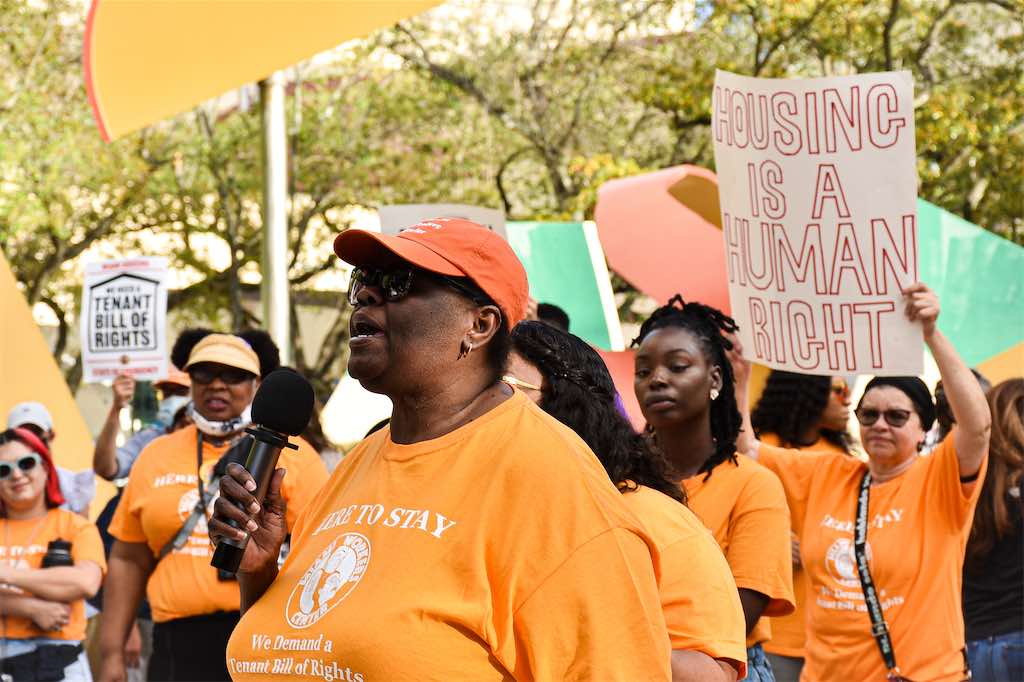
Women of color have always been at the forefront of advocacy, resistance, and social change. On Tuesday, May 3, 2022, the Miami-Dade Board of County Commissioners approved the Miami Tenants Bill of Rights. Behind its creation and passage was the Miami Workers Center, which “organiz[es] towards dignity, power, and self-determination with workers, tenants, and families in Miami, FL,” many of whom are low-wage earning women of color working in the service industry and as care workers. Miami women have been mobilizing and protesting against Miami’s housing crisis, and many spoke before the commission detailing their living conditions and abusive experiences with landlords. At the Miami-Dade County Hall, Mercedes Cabrera, a 38-year-old mother living in private housing subsidized by a federal Section 8 housing voucher, presented to the Miami-Dade County Commission photos of flooded floors and damaged walls, and pleaded for protection against a landlord attempting to evict her because she reported the poor conditions of her housing to authorities. Cabrera asserted to the County Commission, “We have no rights at all. It’s all biased in favor of landlords.” Miami’s housing crisis is not only an economic issue, it is a public health and human security issue.
The Tenants Bill of Rights includes protections for withholding rent to pay for neglected repairs by allowing tenants to deduct the costs of repairs from their rent bills. It establishes the county Office of Housing Advocacy, which creates a telephone hotline for tenants who need assistance and oversees compliance with tenant rules. It protects tenants from retaliation if they seek government help in dealing with a landlord, particularly if the landlord pursues an eviction if a tenant called the helpline within the last 60 days. Additionally, the bill requires landlords to notify tenants of a sale of their home at closing and help them identify a new landlord. It prevents discrimination based on past evictions by prohibiting general questions about evictions during the application process, although landlords can still research past evictions. Black and Hispanic mothers and children are disproportionately impacted by eviction. They are “three times more likely to be evicted than another tenant owning the same amount of back rent.” Having an eviction on one’s record makes finding another place to rent challenging. At the same time, Miami Workers Center reports that less than ten percent of tenants in eviction court have access to legal representation.
Women are disproportionately impacted by Miami’s housing crisis, especially women of color. A 2016 study reports that 20.5% of women in Miami-Dade live under the poverty line, nearly five percent more than men. Miami is the most unaffordable housing market in the country, with rent prices up 30% to 40%. As wages remain stagnant and expenses rise, it is becoming harder and harder for Miamians, especially low-wage, service industry and care workers, to get by. The cost of living in Miami is 17% higher than the national average. According to the Community Justice Project, 20,363 evictions were filed from the beginning of the pandemic (March 12, 2020) through December 31, 2021.
Along with housing costs, housing discrimination is also rising. In the first three months of 2022, one in four complaints to the Miami-Dade Commission on Human Rights was related to housing. Erin New, the director of the commission, states that in addition to housing complaints, there is also an increase in complaints related to “source of income,” which harms vulnerable populations. The majority of complaints, New says, are “members of traditionally underserved, disadvantaged groups. People of color. People with disabilities. Members of the LGBTQ+ community.”
Housing security is critical for formerly incarcerated people and to prevent incarceration. Many nuisance crime arrests in Miami are related to homelessness. In 2021, City of Miami commissioners passed a resolution (4 to 1) that makes homeless encampments illegal, even though housing prices have nearly doubled and wages do not align with rising costs. Without access to affordable and stable housing, it is almost impossible for individuals to avoid homelessness or actions of survival deemed illegal. Women of color are the most vulnerable to becoming homeless after incarceration and face high recidivism rates.
The Miami Tenants Bill of Rights is a victory for tenants, workers, and youth, but, as the Miami Workers Center says, “it is only as strong as it is enforced.” It does not solve the housing crisis, but it is the first step in holding the government and landlords accountable for providing secure housing. The people who build and sustain Miami, the domestic workers, service workers, teachers, janitors, and home care workers, deserve to live here affordably without the fear of eviction and homelessness, and people need protection from arbitrary incarceration. Tenants, and women, are continuing to build power in Miami-Dade.
(By Madeline Ley)
(Madeline Ley is a Miami-based, born and raised in Miami, activist)
(Photo credit: Miami Workers Center)